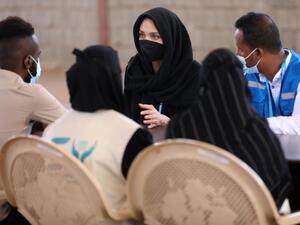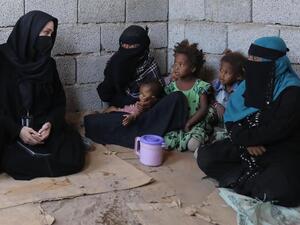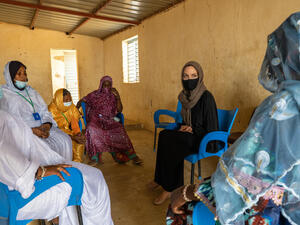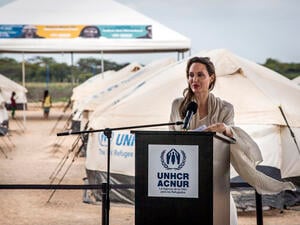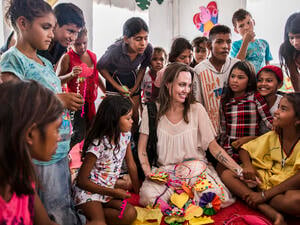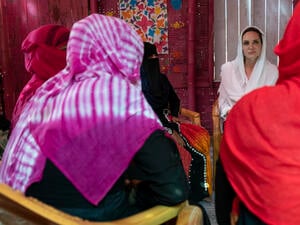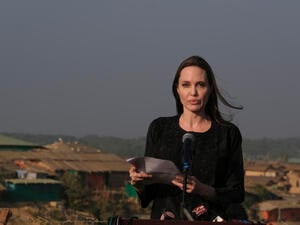Angelina Jolie ends Afghan visit with call for more returnee support
Angelina Jolie ends Afghan visit with call for more returnee support
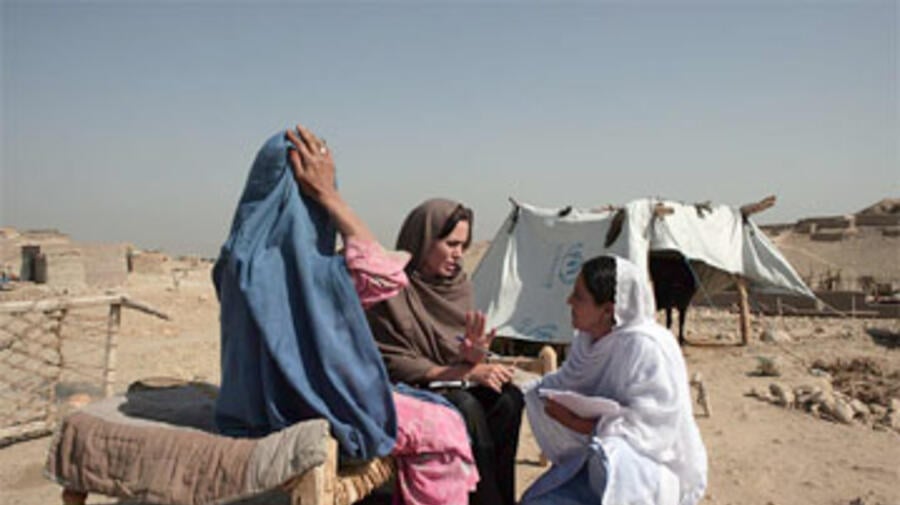
UNHCR Goodwill Ambassador Angelina Jolie talks to returnee women in Nangarhar province during her first visit to Afghanistan.
KABUL, Afghanistan, October 24 (UNHCR) - The UN refugee agency's Goodwill Ambassador Angelina Jolie has concluded her first visit to Afghanistan, where she saw both the successes and the difficulties of return and reintegration. She saw first hand the country's difficult humanitarian circumstances and called for more international support to meet critical needs during the coming winter.
Jolie's two-day trip comes ahead of an international conference on return and reintegration to be held in Kabul next month. Co-hosted by Afghanistan's Ministry of Foreign Affairs and UNHCR, the event will bring government ministries and donors together to see how the country's absorption capacity can best be strengthened to support further repatriation.
The award-winning American actress is familiar with UNHCR's Afghan operation, having twice visited Pakistan in recent years to see Afghan refugees there. But the visit on Wednesday and Thursday was her first to Afghanistan to see the reintegration challenges inside the country.
"The courage, resilience and quiet dignity of returnee families rebuilding their lives against the kind of adversity few of us can imagine shows the human spirit at its best," Jolie said after visiting a number of sites.
On Wednesday, Jolie travelled to Nangarhar province in eastern Afghanistan where almost 850,000, or 20 percent, of all returnees to Afghanistan have repatriated since 2002. Such numbers have placed huge pressures on the limited land availability in one of Afghanistan's most densely populated provinces.
The Goodwill Ambassador visited the Lower Sheikh Mesri settlement site, where some 1,400 returnee families have been living in makeshift shelters and tattered tents. The site's residents outlined the difficulties of finding employment and the limited access to basic social services such as health and education.
Jolie also witnessed the problems encountered by returnees following the summer closure of Jalozai refugee village in Pakistan's North-West Frontier Province. More than 750 families originating from the adjacent Afghan province of Kunar are living on barren land in northern Nangarhar. They have been unable to return to their homes due to insecurity, land disputes and lack of economic opportunities.
"In some ways we were better off in Pakistan. Life is very difficult here. But it means everything to me today to live among my people in my home country despite these problems," said an elderly returnee, Hashim Khan.
On Thursday, Jolie saw similar issues of landlessness and poverty among returnees and internally displaced people (IDPs) living in poor housing conditions in Kabul. The Afghan capital's population has increased threefold since 2001 to an estimated 4.5 million. Refugees and IDPs account for approximately 30 percent of this increase. They compete for jobs with other city inhabitants and the many rural migrants who have come to Kabul in search of economic opportunities.
On her Kabul field trip, the actress visited a site of 18 returnee families who have been squatting in public buildings for several years, unable to return and settle in their province of origin because of poverty.
More than 5 million Afghans have returned home since the fall of the Taliban regime in late 2001, over 4.2 million of them with UNHCR's assistance. But the growing incidence of homelessness is a clear sign that the return of the remaining 3 million registered Afghans still in exile in Pakistan and Iran will be a sharper challenge.
Whilst returnees have contributed significantly to the economy with capital and skills acquired abroad, the huge numbers have stretched the capacities of the Afghan authorities. "Afghanistan has been struggling to absorb these massive returns. It's understandable. It's one of the largest population movements in recent history," said Jolie, as she wrapped up her visit on Thursday.
Noting that the long-term commitment of the international community will be critical to the country's recovery and the prospects for future repatriation, the actress also stressed the need for an increase in humanitarian assistance to the population ahead of the coming winter.
The November conference in Kabul aims to build agreement on how return and reintegration can be sustained by increased bilateral, regional, and international cooperation. Traditionally, refugees are assisted by humanitarian aid budgets. But these have limited impact on sustainable reintegration. So an important objective will be to advance the incorporation of return and reintegration issues more systematically into the planning and budgeting of national development programmes in key areas and sectors.
By Mohammad Nader Farhad in Kabul, Afghanistan

